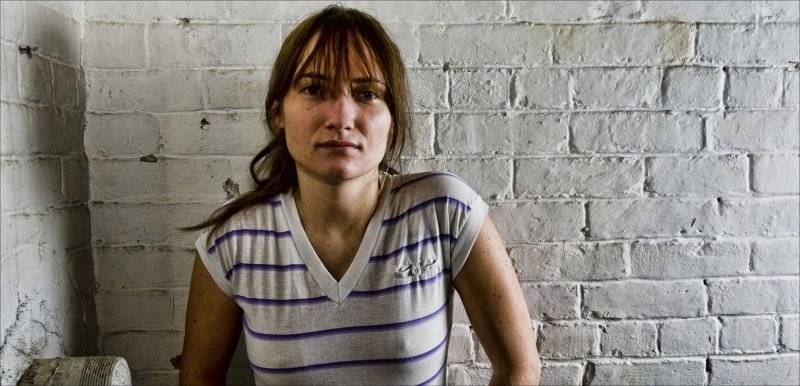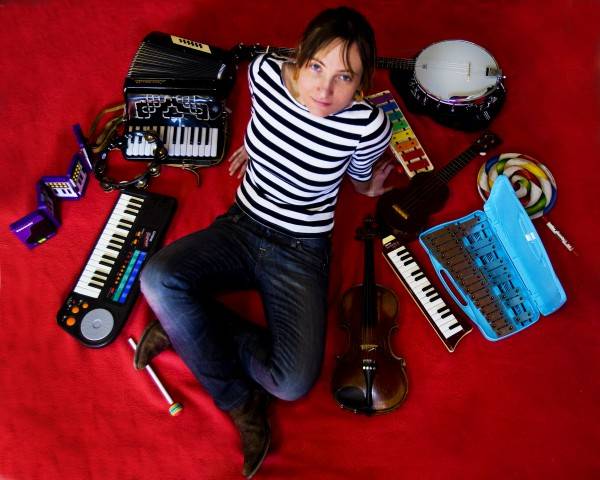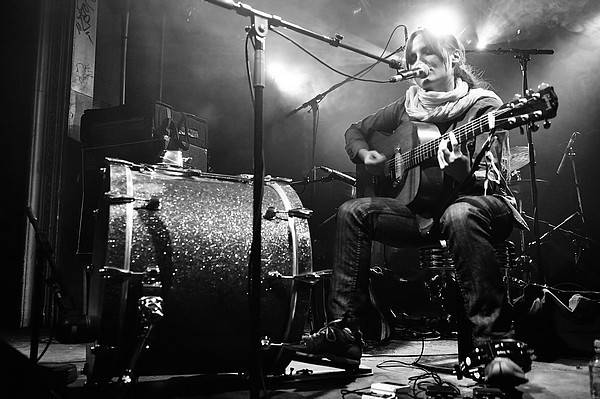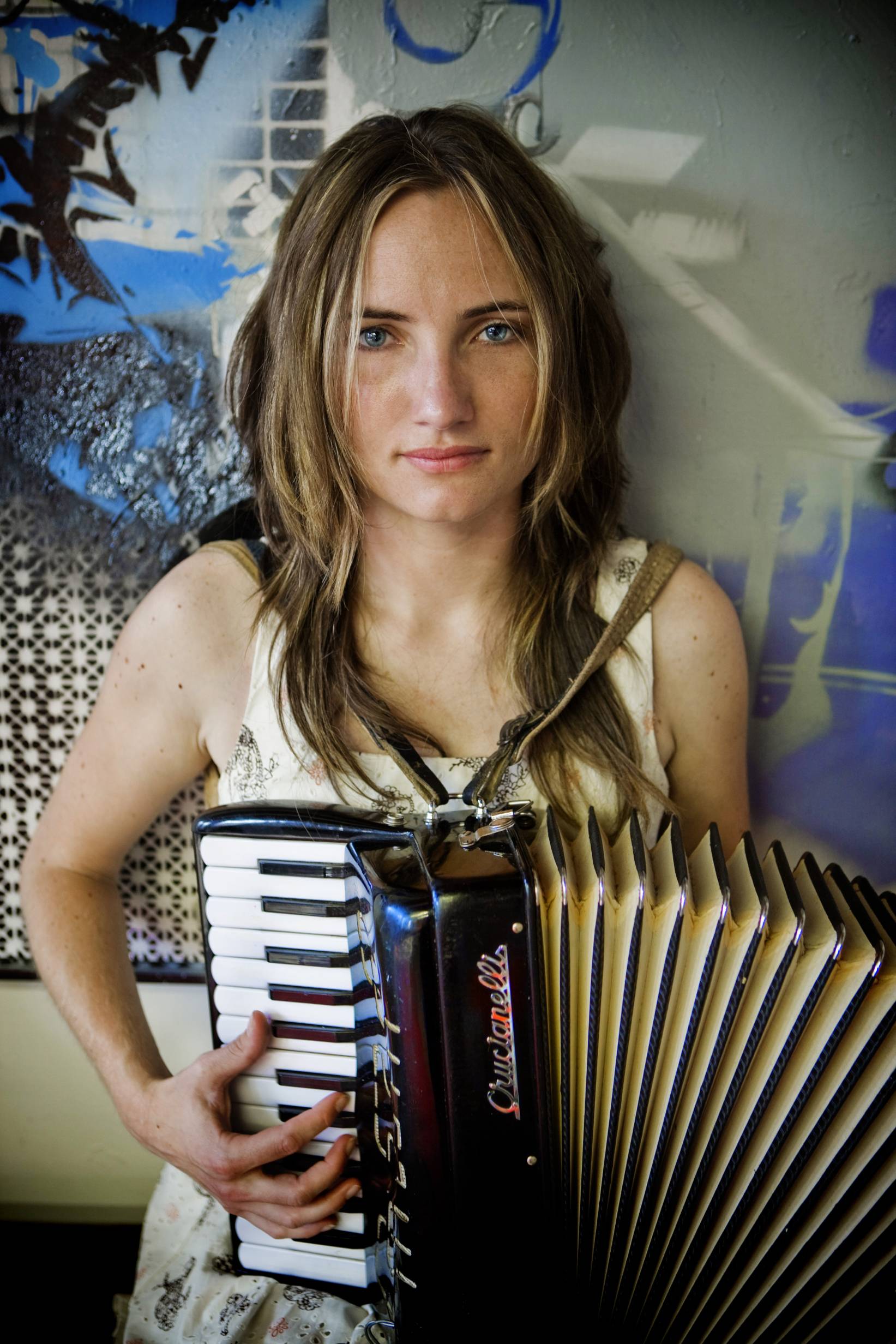
Audrey Ryan is tired of being dumped into the female singer-songwriter category.
“I hate the question, ‘What kind of music do you play?’ My response is just, ‘Listen.’ I can’t tell people what they will hear,” she tells me. “I think of [my music] as quirky, original, indie folk or some such thing. Sometimes I think it’s more experimental. Other times more ‘indie rock.’ Other times I think I’m a folkie, but maybe that’s just because I’m starting to think that is a good place to be because at least those folks are loyal as an audience and respect good songwriting and not just dressing up like a hipster and jumping up and down on a stage like the ‘indie’ kids. Labels are not for me. I just like to play music and let it speak for itself.”
Frankly, I’m tired of pinning taglines to artists, too. So let’s just leave the expressions be and focus on the facts. Ryan, who grew up near Bar Harbor, Maine, and calls the Boston area home, has been playing music for a long time. She’s a multi-instrumentalist who is just as comfortable with accordion as guitar or casio. She sprinkles her recorded songs with glockenspiel, but isn’t afraid of limiting the instrument layering to a bare minimum. Live, she has recently favored the one-woman-band approach, which is not to say she’s a “solo artist” in the traditional sense; she typically performs her own backing percussion by making good use of all four limbs.
You haven’t heard of her, in large part, because she hasn’t found U.S. distribution for her records yet. (Her 2007 album, Dishes & Pills, was released in Europe by Folkwit Records.) But consider yourself now warned: Ryan’s songs are earnest oddballs, the musical equivalent of the bespectacled, high school wallflower who scribbles plucky, poignant observations into a Moleskine. These songs don’t bully their way centerstage; they stand stage left, staring at their shoes until the boisterous, top-of-the-bill songs have been played out, then steal the spotlight once the audience is cranky from one too many over-the-top performances.
Ryan was kind enough to answer a few questions concerning her upbringing in a musical family, her travels around the globe, why being a musician in Boston slays being a musician in New York City, and the book she wrote about her life as a DIY musician.
Smile Politely: To borrow your choice of words, you “reluctantly” began playing guitar at around age ten. Why were you reluctant? Did you have your heart set on another instrument, or did you have no interest in playing music at all?
 Audrey Ryan: I guess what I meant by that is that my father strongly urged me play guitar when I was around ten, and at the time I looked at him as an authority figure who already had too many avenues of telling me what to do in my life, and thought him teaching me guitar would just be another. He said things like, “You’ll thank me when you get older and can play.” Boy, was he right. But it still felt like a drag at first. Plus it’s hard to play guitar and learn chords, especially when you are just a kid. But I stuck with it and by high school I was pretty good; by college I went so far as to take jazz guitar classes and step it up to the next level. I really love guitar now. … It’s definitely my main instrument, the one I’m best at, the one I relate to most.
Audrey Ryan: I guess what I meant by that is that my father strongly urged me play guitar when I was around ten, and at the time I looked at him as an authority figure who already had too many avenues of telling me what to do in my life, and thought him teaching me guitar would just be another. He said things like, “You’ll thank me when you get older and can play.” Boy, was he right. But it still felt like a drag at first. Plus it’s hard to play guitar and learn chords, especially when you are just a kid. But I stuck with it and by high school I was pretty good; by college I went so far as to take jazz guitar classes and step it up to the next level. I really love guitar now. … It’s definitely my main instrument, the one I’m best at, the one I relate to most.
SP: Reading your bio on your website, your parents sound like quite the musical couple who had a distinct influence on you.
AR: My mother was an organist through most of my youth. … She definitely always had music in our lives as kids. … My father still plays guitar, but just with his buddies in our kitchen when they come over. His friend Shirty plays the mandolin and they usually jam on old favorites. For a while I used to join them when I was in town, but it’s been a while since we’ve had such an occasion. But music has always been apart of all our lives, I’d say. If I ever have a family I’d make sure it was in that household too. It’s not so much doing what I do, doing it professionally, that I’d encourage [it]. I’d just encourage people to do art for the sake of art, in whatever form — painting, drama, whatever.
SP: How old were you when you were traveling the globe? What sort of musical lessons did you pick up from visiting Africa, Asia, and Australia? What part of those diverse cultures rubbed off on you?
AR: I first went to Africa when I was 16 on a Kenyan exchange program. I brought my guitar and played it to the other students. It was a pretty big hit for them because most of them didn’t even have the means to own an instrument. We’d do sing alongs in our dorms at night. I’d try to find songs they knew, which was hard, but I found a few. I went back to Africa when I was 18 and worked there for a year teaching English. At the time I wasn’t playing too much because I had had an accident where I cut my index finger and it was still healing and I was going to a physical therapist. So that year was more of a life experience, of traveling, living in a different culture, and just being in a place as rich and diverse and intriguing as Africa.
Later on, during my last year of college, I went to Australia and then Asia. I studied jazz performance at the Sydney Conservatory, which was a great experience and a way to concentrate on music and get better, which I believe I did. Then, when the semester was over I flew to Asia and traveled for several months. It was nearby and cheap to get around, so it seemed like something I should do. I backpacked through several countries and all the while had a little guitar strapped on the back of my pack. I did a lot of campfire sing-alongs and informal concerts for people. It was laid back and fun. I’d say mostly, though, it was just being in those places and having those experiences that gave me a lot of insight into other worlds beyond the one I was born into. That, of course, influenced my songwriting in ways I’m not sure I even can identify.
SP: Are you playing solo at your show in Champaign, or with a backing band? What can we expect, instrument wise, from your performance?
 AR: I play either guitar or accordion with my hands and then drums with my feet (bass drum, tamborine, floor tom). Sometimes I use a loop station to loop guitar parts and then play percussion over them while I sing. It’s a kind of concept I developed last summer while I was up in Maine chilling out. I decided I wanted to create a band with just one person. I felt that if I did that I could just rely on myself and not worry so much about bringing out other musicians with me anytime I have a show (which is pretty often). I guess it’s partly a way to musically challenge myself and partly a way to be self reliant.
AR: I play either guitar or accordion with my hands and then drums with my feet (bass drum, tamborine, floor tom). Sometimes I use a loop station to loop guitar parts and then play percussion over them while I sing. It’s a kind of concept I developed last summer while I was up in Maine chilling out. I decided I wanted to create a band with just one person. I felt that if I did that I could just rely on myself and not worry so much about bringing out other musicians with me anytime I have a show (which is pretty often). I guess it’s partly a way to musically challenge myself and partly a way to be self reliant.
SP: Any luck shopping your forthcoming record to labels for release in the States?
AR: I have a UK label that is very supportive but they don’t work with me much here, just in Europe. I’ve had plenty of interest from various indie labels in the U.S. but have never really struck a deal. Usually I find there is either a conflict of interest or a lack of funds. I do pretty well independently so I only want to sign if someone has something serious to offer me, like great distribution and publicity. … But I’m not desperate for that, it’s not something I need to do what I do. I have a lot of friends who are on labels that take half their CD sales but they don’t sell much more than they did before they were signed. That seems counter-productive to me. I keep 100 percent of my CD sales and my prices are low, so I do pretty well selling songs on my own. But I won’t deny that some label support stateside would be nice, so we’ll see.
SP: From the reviews I’ve read of your work, critics have had a hard time pinning down your “sound.” I’ve seen recommended-if-you-likes ranging from Aimee Mann to Joanna Newsom to Joni Mitchell to Jewel — all over the place. Do you just sort of shrug your shoulders after a while?
AR: Well, it’s the world that has a need to constantly compare things and size them up, not me. I don’t feel I sound like any of those people. But I do admit that Joni Mitchell is a direct influence on me so I take it as a compliment. She is to me as Woody Guthrie was to Bob Dylan — a total inspiration. Aimee Mann is okay. I met her this winter at a Christmas party and she seemed nice, but I’ve never been a real fan. … Joanna Newsom is pretty awesome and original. When I first heard her I wanted to cover my ears and scream. She sounded like a preschooler on drugs scratching at the chalkboard. But over time her music really grew on me. And, if anything, her music is original, and for that I’m honored to be compared to her if it means I’m original too. As for Jewel … well … I can’t relate to her or her music — too pop for me, thanks.
As for shrugging my shoulders, yes, I do. … One review said that I was “a genuine weirdo” who lived in a monkey cave in Somerville. The strange thing is that I was living in something like a cave at the time (it’s a long story). But I actually kind of liked that review. I’m not sure if I’m a genuine weirdo, but I’ll take that over someone saying I sound like Jewel.
SP: How’s life in Boston? Why did you end up there, as opposed to New York City, where a majority of Northeast musicians tend to flock?
AR: I’ve lived in and been in New York City plenty. It’s a total expensive rat race. I play there frequently, am part of a collective indie label there, and have tons of friends down there playing shows and trying to “make it,” and they are all really frustrated. They all work their asses off at real jobs to pay their rent. It’s just not for me. I’d rather live in the middle of nowhere and tour when I feel like it. As for Boston, I’m mostly there because I have a loft there (my “cave”) which also doubles as a DIY space, recording/rehearsal space. It’s big and awesome and would cost a small fortune in New York City but is relatively cheap in Somerville, Mass. So I stay there because of that and because I have a lot of good friends in that city. Plus it’s relatively close to Maine, where I’m from and spend a lot of my time come summer.
 Boston also has a thriving music scene and plenty of venues, and getting press, radio, and just being known in the scene is way easier there than New York City. I definitely have my name out there in the Boston scene, but in New York City you can swim in that pool for years and still be completely and utterly unknown. I know it’s a good place to meet important people and whatnot, but at a high cost. … It’s not 1960 and Bob Dylan isn’t playing in the Village every night of the week. Those days are long over. There is no sense of community in New York City and the market is utterly saturated, so it can be a bit overwhelming and soul-sucking as an artist. It seems like a place to go once you’ve already “made it” — if you ever do. But for me, I’ll take Boston, I’ll take Maine. I’d live in Maine year round if there was more going on and it wasn’t so damn cold.
Boston also has a thriving music scene and plenty of venues, and getting press, radio, and just being known in the scene is way easier there than New York City. I definitely have my name out there in the Boston scene, but in New York City you can swim in that pool for years and still be completely and utterly unknown. I know it’s a good place to meet important people and whatnot, but at a high cost. … It’s not 1960 and Bob Dylan isn’t playing in the Village every night of the week. Those days are long over. There is no sense of community in New York City and the market is utterly saturated, so it can be a bit overwhelming and soul-sucking as an artist. It seems like a place to go once you’ve already “made it” — if you ever do. But for me, I’ll take Boston, I’ll take Maine. I’d live in Maine year round if there was more going on and it wasn’t so damn cold.
SP: Why did you write your book, The Need To Be Heard, about the trials and tribulations of being a DIY musician?
AR: I wrote it because I was touring a lot and had tons of time on my hands between shows. That and because I like to write. I find writing cathartic and the music business is anything but cathartic, so by writing about my experiences it helped me come to terms with them. Lots of people who have read excerpts of the book on my website really enjoy it and can relate to it, which I feel is important. Musicians should share experiences and try and come together on some level instead of it all being some sort of competition of who gets [signed to] what label or what tour. … For now it’s on my website and free to read, but I might publish it at some point.
SP: We’ll end on a different note: Name three dead musicians you’d love to “jam” with, and a brief reason why you chose each.
Hmmm. Probably Miles Davis, John Fahey, and Nina Simone. Miles Davis because In a Silent Way is one of the best “jam” records I’ve ever heard, and I have a fantasy where I’d get all crazy and play the rhodes on one of those sessions. I’m not good enough of course, but it would have been amazing just to be there and see it happen.
John Fahey is a big influence on my guitar playing and even though I think he was a bit of a kook I still would have liked to meet him. … Now he is a “genuine weirdo.” But also totally amazing.
Nina Simone is one of the best singers I’ve ever heard. She has renditions of songs that break my heart and make me want to cry when I hear them. Songs like “Mr. Bojangles” and “I Shall Be Released.” Those songs really move me when I hear her take on them. I think she made me realize how powerful a cover can be if you make it your own and give it all you got.
——
Audrey Ryan is playing with Ryan Groff and Casados at Mike & Molly’s tonight, Friday, April 24. The show will be outside in the beer garden (weather permitting). Casados open at 9 p.m., followed by Audrey Ryan and then Ryan Groff.
All photography courtesy of Audrey Ryan.
Songs, in order of appearance, from Audrey Ryan’s Dishes & Pills: “No Difference,” “People,” and “Later Alligator.”








